
At Lancor, we understand an individual’s power to drive change and add long-term value to a firm. Our focus is on partnering with exceptional people who will positively impact the firms they work for. One of our recent placements at Apollo Global Management is Aaron Miller. A partner, Miller is the head of the firm’s private equity portfolio operating function. He leads a team responsible for helping portfolio companies identify and implement opportunities to increase growth, EBITDA and cash flow. I sat down (virtually) with Miller to speak about his career trajectory, why he puts himself in positions where he can fail, and his inspiring career advice.
Scott Estill: Aaron, you have had such an interesting career and trajectory, graduating with an MBA from Wharton with roles at Bain & Co, followed by roles COO and Board Member positions at different firms including McGraw-Hill. You are currently a Partner at Apollo Global Management. What is your advice for young people who are just starting off their careers and looking at yours as one to emulate?
Aaron Miller: I have always believed strongly that your opportunities continue to grow when you create significantly more value than your work. I am also passionate about fixing broken things, and creating more value at the end of the day than what’s perceived to be there. What I’ve come to understand over the years, is that if I can do that consistently in my career, there generally is opportunity for me. It’s been true for the most part as a consultant. It has been true in the corporate world. It has also been true of private equity.
Estill: There are some people who look at their career as wanting more of a challenge with each step. That has certainly been your path. Why is it important for you to keep challenging yourself?
Miller: Challenging myself at levels that really create a potential to fail has been key for me. I know I have a tremendous number of weaknesses and I put myself in situations that challenge those weaknesses at a really high level often. This has ultimately led to my finding work I am really passionate about.
Estill: I think that is really a strong theme for why you’ve been successful—your desire to go beyond what’s expected, with the added motivation to keep working on getting better.
Miller: Looking back, in high school I started out with a C in PE, but by the time I was a senior in high school, I was running sub two-minute, half miles. I think in college I did the same thing, I would think about what I wanted to do, and work on delivering a great outcome. I always focus on two things. One: Do I want to do this? Two: Can I deliver a better than average outcome if I do? Those two things I would never compromise on. I’m not saying that’s everybody’s formula, because I probably could have done a lot better with incorporating a little bit more on the how. However, I think those two things have been enough for me personally to carry me to where I sit.
Estill: I recently published a piece on diversity and how diversity of thought, experience, race and background allows a team to make better decisions and leads to an increase in profitability. It is also the right thing to do. What is your take? You can’t change the world in a day, but how does the industry have its eyes opened at a faster rate to allow a broader group of people get into those circles of influence?
Miller: I think there is the practical way and the theoretical way. When people say that there’s money to be made in diversity, I don’t think that 90% of people believe that. I think most people think of diversity as the right thing to do and that everybody should have opportunity. I think that’s what people believe and why they pursue it. I think the theoretical is that if I try to come up with an answer and I do it by myself, the probability that I’m going to be off is higher than if I put three people in the room and they think about that answer too. That is diversity, the likelihood that together we get to a better answer. I think when people understand the argument that the more different opinions we have in the room delivers greater returns, that’s when they really understand that concept.
Estill: That will hopefully open the doors to allow people to join boards and to be operating partners and to take advantage of the opportunities that exist.
Miller: I think I’m at a company that wants to make change and I have enough of a platform at Apollo to drive change. I know we are doing that through boards. I think by the end of this quarter, 100% of our boards will have a woman on it, and 100% of our boards will have an underrepresented minority. So the firm has definitely accepted me challenging it internally. What I believe is good, given my experience, was a higher bar and they let me challenge it and that’s leading to lasting and positive change.